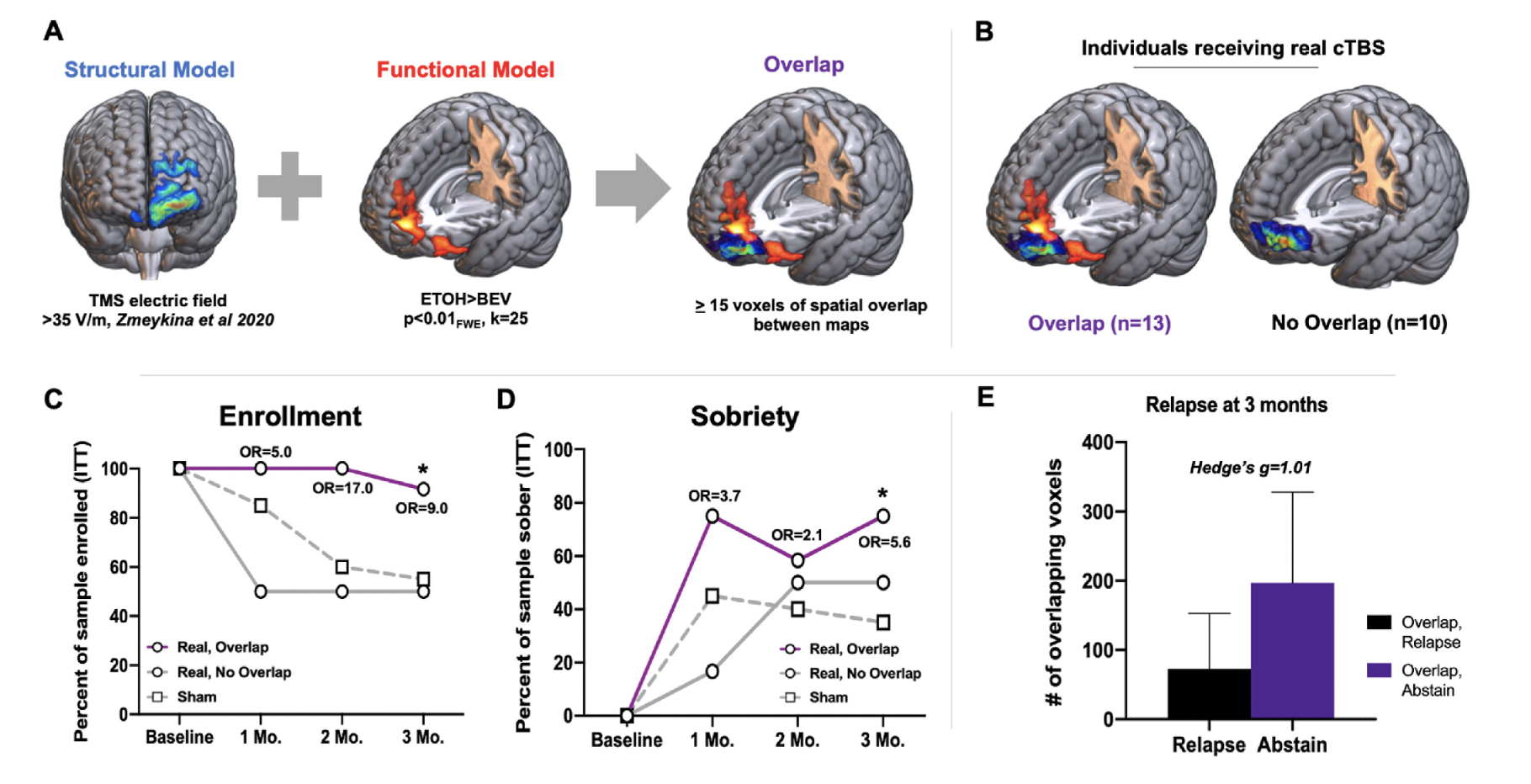Dan McCalley, Ph.D.
Postdoctoral Fellow, Stanford University
Neuroscience, Psychiatry & Behavioral Sciences
he/him
Dan McCalley, PhD is developing non-invasive, neural-circuit specific therapeutic tools for individuals with Alcohol Use Disorder (AUD). In graduate school, Dan became interested in Transcranial Magnetic Stimulation (TMS), a form of non-invasive brain stimulation that has shown immense promise in helping individuals achieve sobriety. Dan led a large-scale analysis of a randomized, double-blind, sham-controlled clinical trial which delivered 10 sessions of TMS to individuals with AUD over 10 days. Following this treatment, individuals who received TMS, relative to sham, were nearly 3X more likely to stay sober for 3 months.
Now a postdoctoral scholar at Stanford University, Dan is interested in leveraging patient-level neuroimaging data to develop TMS-based treatment approaches that are tailored to each unique individual with an Alcohol Use Disorder. In a recent, retrospective analysis, Dan demonstrated that incorporating features of individual brain function and structure into treatment may improve one’s likelihood of remaining sober for 3 months by 5-6X.
He is committed to continuing to develop innovative and impactful treatment strategies for individuals with Alcohol Use Disorder. Dan strives to be an excellent mentor to his students and is an ardent advocate for LGBTQIA+ advancement and equity within the sciences. Outside of his research, Dan enjoys traveling, hiking, tending to his plants, binge watching survivor, and spending time with friends and family.
About Dan
B.S. in Neuroscience, Aug 2013 - Aug 2017
University of Pittsburgh, Pittsburgh, PA
Ph.D. in Neuroscience, Aug 2017 - May 2022
Medical University of South Carolina, Charleston, SC
Postdoctoral Fellowship in Psychiatry, July 2023 -
Stanford University, Palo Alto, CA
Education
Skills & Interests
Transcranial Magnetic Stimulation
Functional Neuroimaging (fMRI)
Preprocessing, event & block design, general linear modeling, BOLD signal magnitude, functional connectivity, resting state functional connectivity
Structural Neuroimaging
TMS electrical field modeling, voxel-based morphometry, diffusion weighted imaging
Developing Transcranial Magnetic Stimulation as an effective treatment for Alcohol Use Disorder
Recent Publications
-
A New Era in Mental Healthcare: Brain Stimulation Therapy for Addiction (and beyond)
Nerd Nite, San Francisco
Rickshaw Stop, March 20 2024
Drinking and drug use in California, how TMS works, the road ahead for developing TMS as a treatment for alcohol and cocaine use disorders
-
Medial Prefrontal Cortex Theta Burst Stimulation Improves Treatment Outcome in Alcohol and Cocaine Use Disorder
Society for Biological Psychiatry
Austin, Texas, May. 9-11, 2024
Clinical results from two randomized control trials using TMS as a treamtent for alcohol and cocaine use
-
Broad or precise? Evaluating two TMS approaches targeting brain networks among Veterans with AUD
Research Society of Alcohol
Minneapolis, Minnesota June 22-26, 2024
A comparison or two TMS strategies to modulate the brain and reduce drinking among Veterans with AUD
Awards, Recognitions, & Funding
-
University of Pittsburgh Honors College (2015)
Competitive summer undergraduate research fellowship which enabled me to independently evaluate the impact of adolescent cannabinoid use on adult cognition in rats.
-
Medical University of South Carolina
1st Place Poster, MUSC competition in communicating complex scientific topics to a lay audience (2021)
1st Place Oral Presentation, MUSC student research day (2021)
-
Research!America
Awarded start-up funds to create a student-led group designed to empower students to pursue careers at the intersection of science and legislation (2020-2021)
-
National Institute on Alcohol Abuse and Alcoholism
2-year independent reserach fellowship to evaluate neural architecture as a novel biomarker for TMS efficacy in Alcohol Use Disorder (2020-2022)
-
Highest distinction available to graduating students at MUSC; given in recognition of exemplary contributions to science, community, and leadership (2022)
-
National Institute of Health and National Institute of Mental Health
National award given in recognition of outstanding research and potential as a leader in innovative neuroscience
Contact Dan







